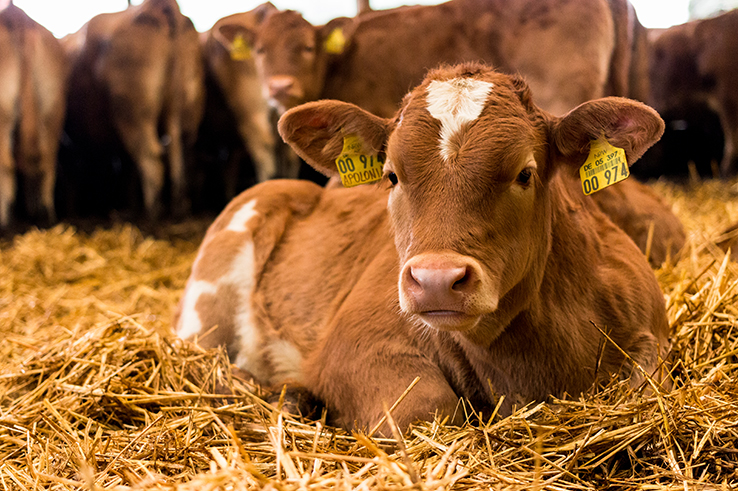Amino Acids
Amino acids are vital for all living beings to build proteins. Amino acids and proteins are the building blocks of life.



Ruminants are the connecting link of agriculture in the conversion of non-edible plant components into valuable protein for human nutrition. High efficiency is essential to reduce the ecological footprint to the minimum.
Thanks to important progress in genetics, performance and efficiency have increased significantly. However, this development is accompanied by metabolic challenges that, without adequate care for the animals, can lead to health problems with reduced fertility and a reduced lifespan.
A targeted diet with the right feed additives is able to counteract these challenges.
A high-performing dairy cow gives around 50 l of milk per day.
In doing so, she gives 2.0 kg fat, 1.7 kg protein and 62.5 g calcium!
80% of harvested plant material cannot be digested by humans, but almost entirely by ruminants.1 The reason for this is the rumen microbes, which are able to break down cell wall components of the plants, metabolise them and in doing so provide the host with valuable nutrients for its own metabolism (host-microbe cross feeding).
Methane from the digestive tract of ruminants dominates global agricultural non-CO2 emissions with a share of 47 % (of which cattle farming for meat production accounts for 55 % and dairy farming for 18 %).2 Modern feeding strategies must therefore contribute to further reducing the ecological footprint of this animal group without endangering their health.
The transition of a high-yielding dairy cow from pregnancy to lactation, the so-called transit phase, poses an enormous metabolic challenge. The ratio of nutrients that the dam invests first in foetal development and later in milk synthesis varies, especially in the six-week period around the calving date. Targeted feeding concepts make a significant contribution to preventing the associated metabolic disorders such as parturient paresis, ketosis, rumen acidosis and secondary diseases.


As the reduction of methane emissions is currently the hot topic in cattle feeding, at Kaesler Nutrition we are also actively involved in research in this direction.
Phytogenic additives are becoming increasingly popular and are increasingly used as technological, sensory or zootechnical feed additives due to their functional properties. The Spicemaster range by Kaesler Nutrition can support energy metabolism and prevent inflammation. Supplementing L-carnitine (Carneon by Kaesler Nutrition) to dairy cow rations during the transition period is also known to enable the transport of fatty acids into the mitochondria to generate energy.

For further information or if you need help in finding the right product or solution, please contact us.

The present study sought to determine the impact of dietary inclusion of Loprotin on early lactation high producing dairy cows during a period of long-term environmental heat stress.
1 Nabuurs et al. (2022): Agriculture, Forestry and Other Land Uses (AFOLU). In IPCC, 2022: Climate Change 2022: Mitigation of Climate Change. Contribution of Working Group III to the Sixth Assessment Report of the Intergovernmental Panel on Climate Change. Cambridge University Press, Cambridge, UK and New York, NY, USA. doi: 10.1017/9781009157926.009
2Clark, H. (2022). IPCC AR6 Working Group III report: Overview of agricultural sector emissions. In: 2 nd one-day symposium of the Animal Task Force & the EAAP Commission on Livestock Farming Systems. http://animaltaskforce.eu/Portals/0/ATF/2022/EAAP2022/EAAP2022_S02_02_H.Clark_FINAL.pdf?ver=2022-10-03-025459-597
